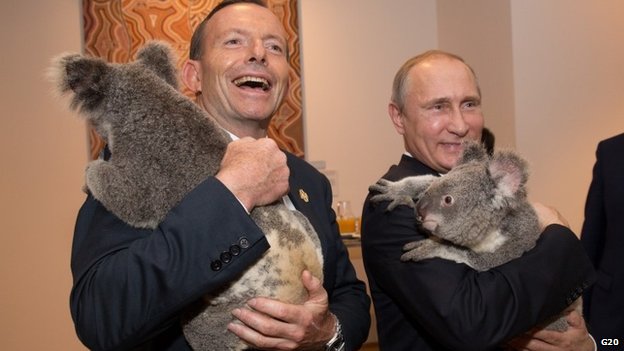G20 summit: Economic growth focus of final day
The G20 summit in Australia has entered its second and final day with the focus on economic growth.World leaders are due to declare a commitment to growing their economies by 2% more than expected by 2018.The first day was overshadowed by anger with Russia's President Vladimir Putin over the conflict in Ukraine.Mr Putin criticised US and EU sanctions imposed over Russia's involvement in the Ukraine conflict, saying they hurt the West as well as Russia.
On Saturday, Canadian Prime Minister Stephen Harper, US President Barack Obama and British Prime Minister David Cameron all sharply criticised Russia.The Kremlin denies that it has sent military forces or heavy weapons to pro-Russia rebels in eastern Ukraine.There had been reports that Mr Putin, faced with criticism over Ukraine, would leave the summit early, but his spokesman, Dmitry Peskov, said he would only leave "when all the work is completed."
 The G20 groups leaders from rich and emerging economies
The G20 groups leaders from rich and emerging economies

President Putin faced a frosty reception from Western leaders at the G20 meeting
The US and the European Union have put in place a series of sanctions against Russia since its annexation of Crimea from Ukraine in March.In an interview given on Saturday to Germany's ARD TV, Mr Putin called for an end to sanctions."What is happening regarding the so-called sanctions is, first and foremost, harmful to the world economy, and to us...and runs counter to what we shall be trying to reach an agreement on at the G20 summit," he said.
'Brisbane Action Plan'
Finance ministers from G20 countries drew up plans in February to boost global growth by 2% in five years.The BBC's James Landale in Brisbane says this is "a pretty ambitious target" for many G20 countries that are struggling with recession or little growth.How it is achieved will be announced later on Sunday in the "Brisbane Action Plan"."We cannot rest, the world needs growth," Joe Hockey, Australia's Treasurer said.
What is the point of the G20 summit? In 90 seconds
Meanwhile, President Obama warned on Saturday that Asia's security must not be based on intimidation of small nations by big ones, but on mutual alliances.He did not mention China explicitly but he warned of the dangers posed by territorial disputes in the South China Sea, where Beijing's actions have raised concern among its neighbours.
Mr Obama said there was "no question" over his commitment to Asia-Pacific allies, referring to US efforts to strengthen strategic ties with the region.In other developments, G20 leaders released a statement in which they vowed to do all they could to "extinguish" the Ebola outbreak in West Africa.It said that member states were committed to do what was necessary "to ensure the international effort can extinguish the outbreak and address its medium-term economic and humanitarian costs".
News Content Courtesy: bbc.com











